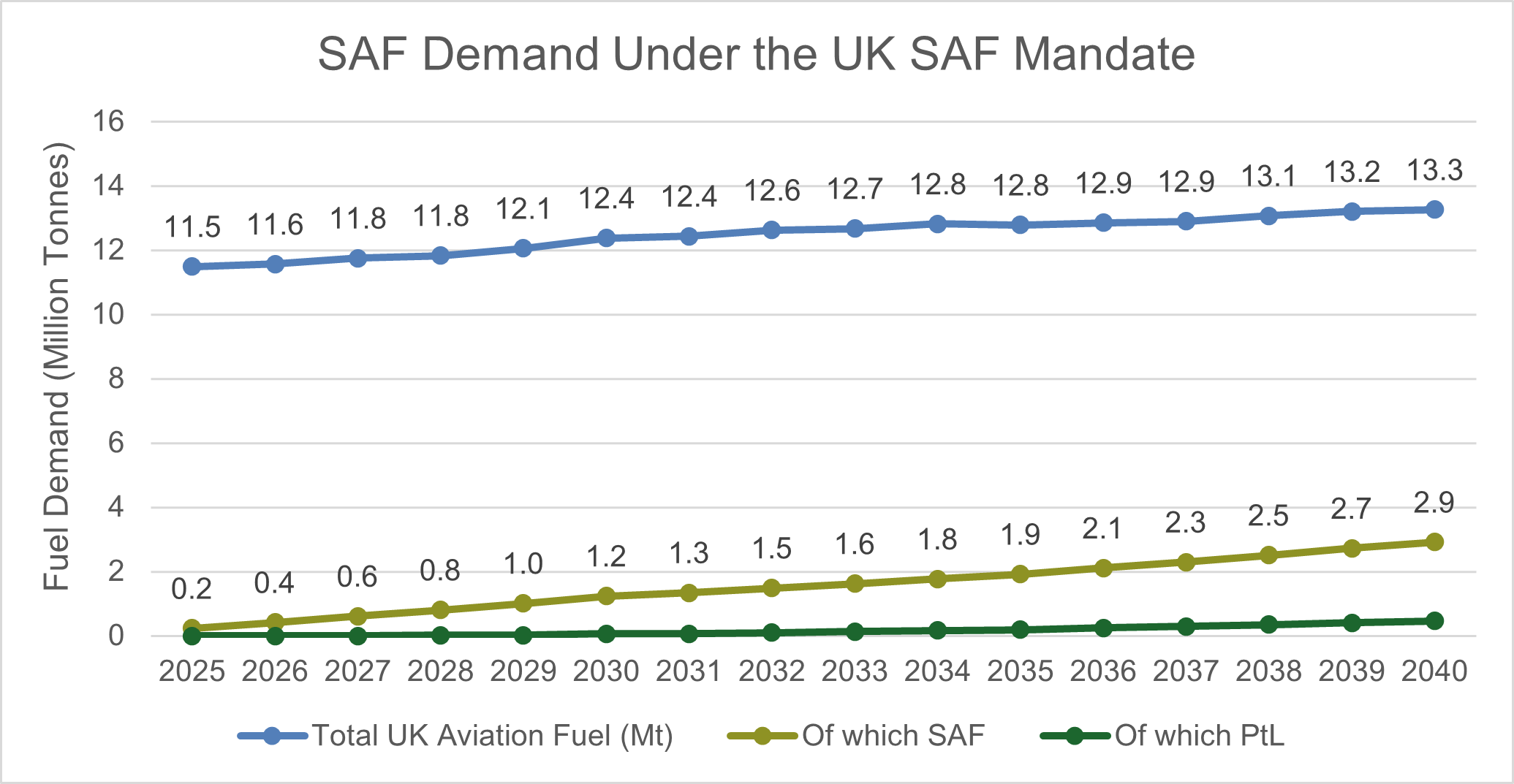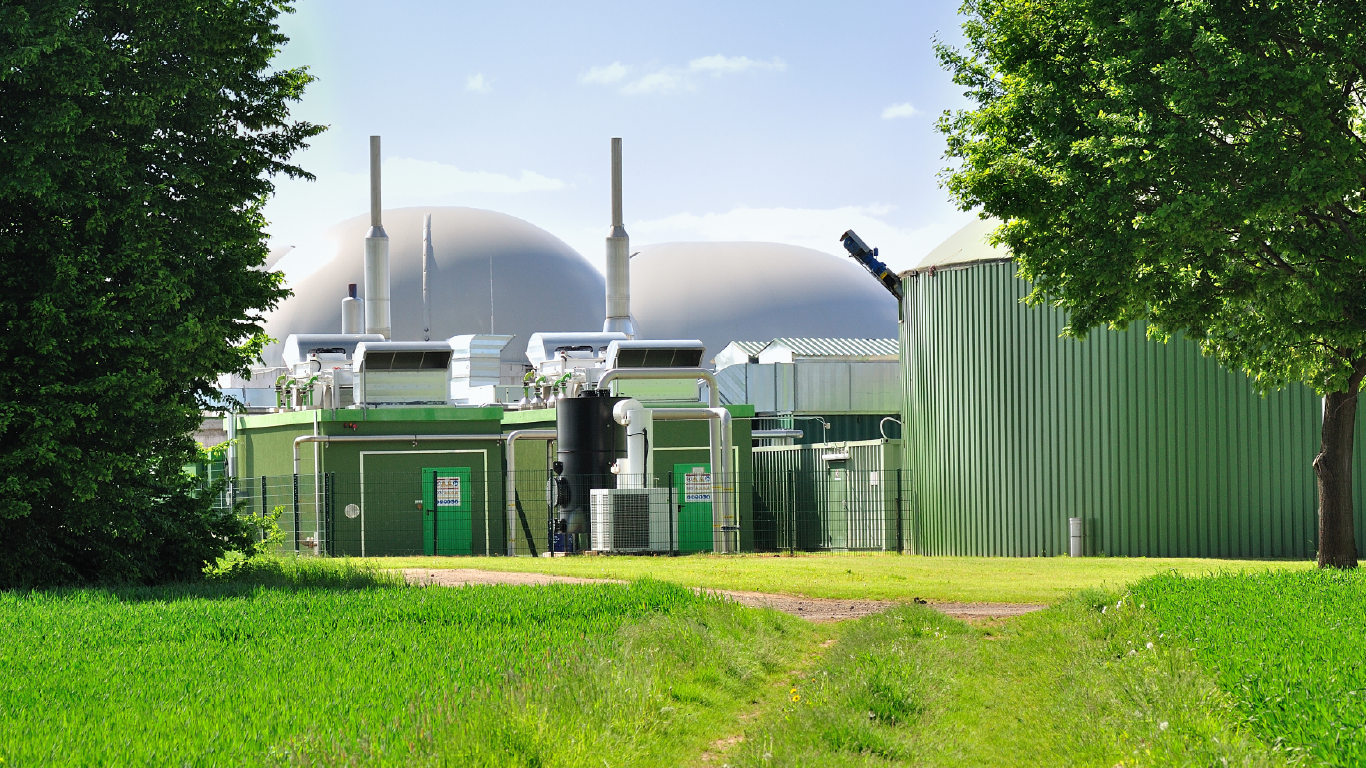Wednesday, 23 July 2025
Is Sustainable Aviation Fuel the Answer to Decarbonising UK Aviation?

Decarbonising aviation is essential for the UK to meet its legally binding net zero target by 2050. Demand for air travel is not expected to fall, and other sectors are progressing in their decarbonisation efforts. As a result, the independent body, the Climate Change Committee (CCC), forecasts that aviation could account for 16% of the UK’s total emissions by 2035 – up from 9% in 2025. One of the most promising solutions identified by both government and industry is Sustainable Aviation Fuel (SAF).
What is Sustainable Aviation Fuel (SAF)?
As an alternative fuel, SAF will cut greenhouse gas emissions by 70% when compared against fossil aviation turbine fuel (kerosene) on a lifecycle basis. The reduction is due to the materials used to create this fuel. Methods of creation, including bio-waste and captured CO2 and low carbon hydrogen, produces sustainable fuels with same chemical composition as conventional aviation fuel. This means that it can be “dropped” into existing infrastructure without modification and blended or simply replace fossil-based kerosene. As such, the aviation sector is slowly phasing in SAF; from 2023 to 2024, its share of UK jet fuel supplied rose from 0.7% to 2.1%.
Compared to emerging technologies, such as hydrogen-powered or battery-electric aircraft, SAF offers several near-term advantages:
- Commercially more mature and requires no major infrastructure overhaul.
- The potential to be made using a wide range of feedstocks and production methods – offering significant scalability and diversification.
- Improving local fuel security and domestic supply chains.
How does the SAF Mandate Drive Demand and Investment?
The next step for SAF as the most suitable option for decarbonising UK aviation, is securing long-term demand. To drive investment in its production and associated infrastructure, Government implemented the UK SAF Mandate at the start of this year. In 2025, aviation turbine fuel suppliers are required to provide at least 2% of SAF by volume in their fuel mix. This obligation will scale incrementally to 22% by 2040 with the potential to extend further. As shown in the graph below, SAF demand should increase from 200,000 tonnes in 2025 to almost 3 million tonnes by 2040.

Source: UK SAF Mandate: Final Stage Cost Benefit Analysis Dataset, UK Government
Recognising that a wide range of production technologies and feedstocks are needed to meet future obligation years, the UK SAF Mandate introduced additional policy mechanisms. Firstly, there is a cap on how much HEFA can be used to fulfil the obligation – reducing from 100% in 2025 to 35% in 2040. On top of this, the Mandate includes a sub-mandate for Power-to-Liquids technology which uses captured CO2 and low carbon hydrogen to produce SAF. This sub-mandate will be introduced in 2028, at 0.2% of total UK jet fuel demand, and will scale to 3.5% by 2040, helping to reduce supply chain pressure on biomass feedstocks.
With the UK Mandate in place, providing certain long-term demand, the government has set a clear signal for investment into SAF as a driver of UK decarbonisation.
Domestic SAF Production in a Competitive Market
From 2030, global SAF demand is expected to exceed supply, with an estimated 26 million tonne supply gap that could risk the availability of imported SAF volumes for the UK. Domestic production of SAF is thus critical to strengthening the UK’s energy security, reducing reliance on imported aviation fuel and meet rising demand under the SAF mandate. If the UK acts early, it could also position itself as a global market leader and exporter of SAF. This could allow the UK to capitalise on aligned policy momentum such from the EU’s ReFuelEU. This initiative is significantly more ambitious than the UK Mandate, obligating EU airports to supply 42% SAF (by volume) by 2040, rising to 70% by 2050.
As part of the drive to secure domestic SAF production, the government aims to have five SAF production plants under construction by the end of 2025. However, as of mid-2025, the UK has only one industrial-scale SAF facility in operation: the Phillips 66 Refinery in Humberside which is expected to produce 40,000 tonnes of SAF in 2025. This means that fulfilment of the UK SAF Mandate is vastly unachievable through domestic volumes alone.
Deploying commercial SAF production faces several barriers, including high capital costs – ranging from £600 million to £2 billion per plant – and financial losses in the first years of operation. Developers are also contending with global market volatility, driven by uncertain US policy, lower fossil fuel prices and broader macroeconomic headwinds. These factors have already led to major delays and cancellations of SAF projects in the UK, EU and US, and are likely to continue affecting the market in the near term given the limited volumes currently in production. Together with the minimal domestic SAF available, these barriers highlight the need for government support to drive production growth.
To mitigate these risks, the government has invested £135 million through the Advanced Fuels Fund into 14 UK SAF production facilities, which has the potential to unlock over 700,000 tonnes of SAF supply each year. The UK Government confirmed further support to the domestic SAF industry as recently as July 22, announcing an additional £65 million of funding to 17 projects.

Despite this funding stream, certain challenges have still arisen. The recent bankruptcy filing by Fulcrum BioEnergy, developer of one of the five facilities planned to be under construction this year, has cast doubt over the project’s future. Compounding this, the project’s associated government funding is only available until the end of 2025. As the third-largest SAF facility among those funded, this uncertainty puts a significant portion of the UK’s SAF ambitions at risk. Given these challenges and the risk of other projects facing delays, it is increasingly unlikely that the UK will meet its target of five SAF production facilities under construction by 2025.
Securing SAF Revenue Certainty
In the face of high global competition for SAF, market volatility, and the risk of domestic production delays, the UK government must act swiftly to secure the 1.2 million tonnes of SAF required by 2030 under the UK SAF Mandate. Under current timelines, the government plans to introduce a Revenue Certainty Mechanism by the end of 2026. This mechanism would set a strike price for SAF over a defined period. If the market reference price falls below this strike price, then the government would compensate producers, shielding them from external market shocks and providing investor confidence.
However, without this mechanism in place, we see potential developers delaying investment decisions, awaiting greater policy clarity or even the first auction rounds to de-risk their revenue stream. Given that projects can require up to five years from conception to production, this dynamic jeopardises the UK’s ability to meet SAF demand in the near-to-medium term. To avoid this outcome, the government must act decisively and provide certainty as-soon-as-possible to domestic producers to enable the necessary scale-up.
The Future of SAF
Among low-carbon fuels, SAF stands out with one of the most robust demand outlooks – both in the UK and globally. The UK Government and aviation industry have made it clear that SAF will play the determining role in decarbonising UK aviation. Through the SAF Mandate and further investment in the Advanced Fuel Fund , the government has already taken important steps to stimulate demand and support domestic production. However, the government must provide revenue certainty to producers as-soon-as-possible to secure required SAF volumes. With bold action today, the UK can lead the global transition to sustainable aviation tomorrow.
At Talan, our Low Carbon Molecules team is committed to supporting businesses navigate the evolving policy and regulatory landscape of SAF. Under the experience of our dedicated technical experts, policy advisors and economists, we can help your business succeed in this rapidly scaling market.
Let's Talk!

Related topics